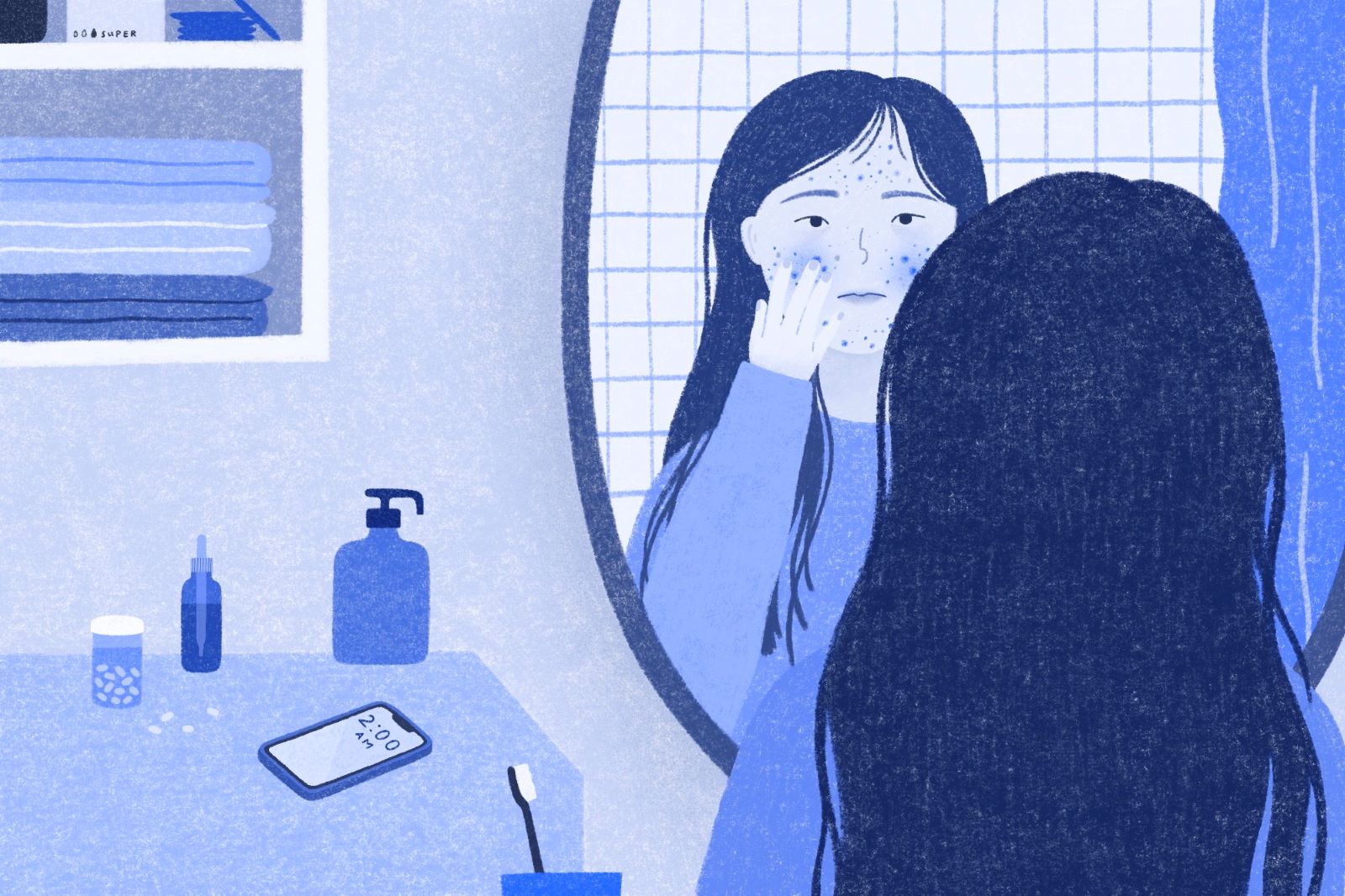When we feel stressed, our skin often acts up: frenetic periods at work or traumatic events can be accompanied by pimples, dry skin, or even flare-ups of conditions such as psoriasis and eczema. “When I have patients coming into the office with a bad flare in a longstanding disease that’s been otherwise stable, I ask them what’s going on in their lives, and nine times out of 10 there’s something big that’s causing stress—they’ve just had a baby or lost a loved one or are getting divorced or going through finals,” says Dr. Gina Caputo, a Delaware dermatologist with a special interest in psychodermatology and psychocutaneous medicine.
What’s actually going on in our bodies? When we have a strong or long emotional response, we release chemicals such as cortisol, histamines, and prostaglandins, which can make skin oilier, drier, and more irritated, and also trigger skin conditions. “Just because you have stress doesn’t mean you will get acne, psoriasis, or any one of those things, but if you have a predisposition then it can act as a tipping point,” says Caputo. This explains why some people can go through life without any skin issues and then suddenly experience them during a difficult time.
It isn’t just the chemical response that causes bad skin in bad times. Behaviour might also change—sleep is affected, for example, or we might pick up harmful habits as a coping mechanism. “Alcohol and caffeine can have a direct impact on skin, causing dehydration and skin aging,” says Vancouver dermatologist Dr. Shannon Humphrey. Some people may also start smoking or eating unhealthy foods, potentially leading to oxidative stress that can contribute to skin aging. And, says Dr. Mohammad Jafferany, a psychiatrist and professor of psychodermatology based in Michigan, lack of sleep can cause eye puffiness and dullness, and frowning can make skin wrinkled.
Stress leads some people to pick at their skin and pull out their hair (trichotillomania). “Skin picking is common but under-reported—it ranges from 1.4 per cent to 5.4 per cent in the general population,” says Jafferany. “Similarly, the incidence of trichotillomania is estimated at between 0.6 per cent and 4 per cent.” Caputo agrees that these conditions are under-reported: “I see a lot of skin picking in my clinic, to be honest—more than I think I should be seeing.”
Humphrey points out that the relationship between emotional health and skin health isn’t uni-directional: your mood can affect your skin, but your skin can also affect your mood. People with chronic itching might lose sleep, for example, leading to tiredness, irritability, and even more stress. And then there’s the simple fact that if we think we look bad, we feel bad—such as when we have a pimple and worry that everyone is staring at it.
“Our psychological and emotional health is also affected by the appearance of skin,” Humphrey explains. “We are genetically imprinted to assign positive attributes to people who have high-quality skin.” Traits associated with youth such as smooth, radiant skin are also related to fertility, she says—someone who has these attributes must be young and healthy enough to reproduce. “That helps us understand the relationship of: if your skin looks good, you feel good; if your skin looks bad, you feel bad; and other people interact with you positively or make negative judgments of you.”
Sometimes a patient might require the support of a counsellor or psychologist to help treat the underlying cause of a skin condition. This is particularly helpful for skin picking and trichotillomania. “Habit-reversal therapy is the most evidence-based treatment for both of these disorders,” Jafferany says. “In this method of treatment, patients are taught to become aware of their urges and triggering events and learn substitution techniques and stimulus-control strategies.” Antidepressants and anti-anxiety medication can also help.
According to Caputo, there are only 10 recognized specialists in the U.S. who focus on the connection between skin and mental health. It is not a recognized subspecialty in Canada, but a group of dermatologists based in Quebec is campaigning to change that.
Humphrey says emotional health is always a part of her conversations. “Esthetic appearance is one piece of the pie of wellness, so in all my consultations I talk about stress and stress management, regularity of menstrual cycles, how a person is sleeping, diet, and exercise,” she says. “There is a burgeoning specialty of integrative medicine that puts the patient in the middle and acknowledges all the factors contributing to holistic wellness. I’m not trained in that, but I acknowledge that what I do for skin is not independent of all the health, wellness, and lifestyle factors. This is when we can bring multiple experts and practitioners to help the patient have positive emotional and psychological well-being.”
If you’re experiencing skin issues, it’s worth considering your whole self when trying to treat a breakout or flare-up. Stress-management techniques such as deep breathing, exercise, meditation, and mindfulness might not get rid of a zit as quickly as a pimple patch, but in the long run, they might make you—and your skin—calmer and more content.
Read more beauty stories.









